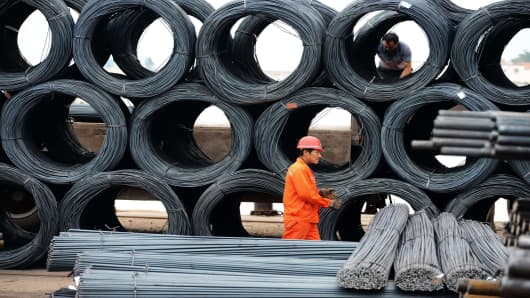China's official Purchasing Manager's Index (PMI) for June is likely to show that factory activity contracted for the first time in nine months, according to one economist.
Dariusz Kowalczyk, senior economist, Asia ex-Japan at Credit Agricole is forecasting that the official June PMI that is scheduled to release Monday will fall to 49.7 - a level unseen since September 2012 - from 50.8 in May.
A reading of 50 and above indicates expansion, while one below that signals contraction.
"The [manufacturing] sentiment is not that good. There are many sentiment indicators that have been released recently such as banking sentiment, entrepreneurs' confidence, consumer confidence that have shown deterioration that basically corresponds to the slowdown of China's potential growth from double digits two years ago to [around] 8 percent now," Kowalczyk said.
According to Rob Subbaraman, chief Asia economist at Nomura, the official PMI will weaken to 50.2 in June, adding though there are downside risks to his forecast.
"There is the risk the official PMI, which is really the one that is mostly in focus, could be the first sign that China's economy is really starting to weaken sharply again," Subbaraman added.
Together with the official PMI, HSBC will also release its final June reading, which is also expected to fall further to 48.2 from a preliminary figure of 48.3, said experts.
China's official manufacturing survey, which focuses on big and state-owned firms compared to the private HSBC survey which targets small and private companies, has generally painted a brighter picture of factory activity.
In May, the official PMI came in above expectations, rising marginally to 50.8, while HSBC's final reading of 49.2 showed
factory activity shrank
for the first time in seven months.
(Read More:
China PMI Slump Will Test Authorities' Resolve
)
"I think we should not have our hopes too high, and probably both PMIs are going to be quite weak, although I would expect the official PMI to be not as bad as the HSBC one," Louis Kuijs, chief China economist at RBS said.
One of the reasons for the pessimism is weakening exports. In May, China's exports posted their lowest growth rate of 1 percent in almost a year. Plus, the HSBC flash PMI data released last week showed that new orders dropped to their lowest level in 10 months, suggesting weak demand at home and abroad.
(Read More:
China Trade Data Underscores Growth Worries
)
Alistair Chan, economist at Moody's Analytics said export demand will continue to be weak.
"We have long expected that there will be a period of weakness for some time [through 2014]. This is to do with the slow recovery in the U.S. and Europe and the rising yuan," Chan said. "I think it shows that China's development is not a straight upwards trend."
Major banks and international agencies have been downgrading their economic growth forecast for China for 2013 over the past month. The official growth target for the year is 7.5 percent but experts say there is a likelihood that China could undershoot that target.
- By CNBC.com's Rajeshni Naidu-Ghelani; Follow her on Twitter @RajeshniNaidu


